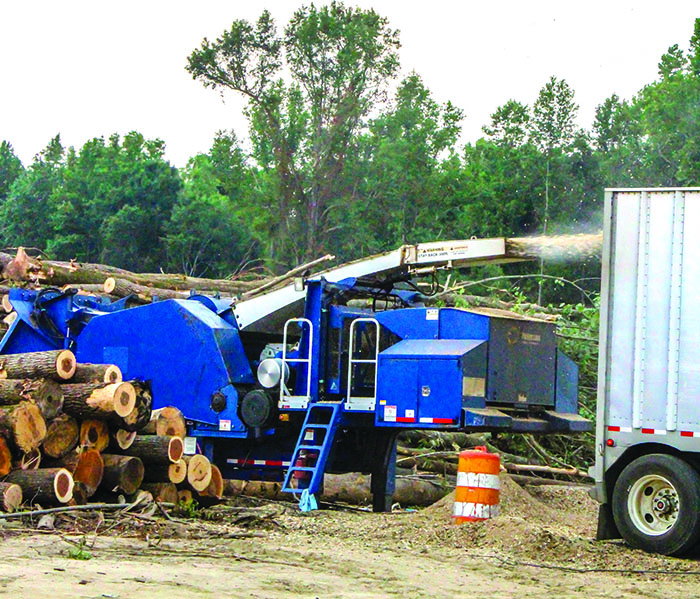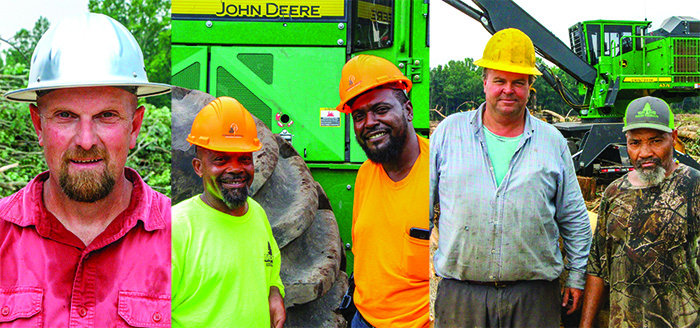
Forester Jason Tew, 45, has been in the timber business since 1994. A graduate of Wayne Community College’s Forest Management Technology program, Tew has always been interested in the equipment and logging aspect of the timber industry. After years of being a timber buyer for others, Tew struck out on his own five years ago creating Neuse River Forest Products, a one-man timber buying entity with wood supply contracts throughout the timber rich North Carolina coastal plain region—including Enviva Biomass.
After a few years working with contract logging crews, Tew says he was getting somewhat frustrated with his logging capacity, and how other crews handled jobs. For example, Tew really hates having trash on the ground in the woods, preferring instead to invest in trash cans/bags and emptying them each week. “That’s not something you can force someone else to do,” he says. “There were just some things I wanted to do differently, so I decided to do it on my own.”
But, for many years, Neuse River FP continued because Tew has one contractor that works well. “He does a great job,” Tew says of the man. “But we outgrew his logging capacity. And finding another one was almost impossible.” Ultimately Tew took matters into his own hands and started his own logging crew, NRFP Logging, in 2018 when the business was financially able to take the chance. “I’ve always wanted to start one,” he shares. Adding his own crew caused some to give opinions on if it was or was not a good idea, but overall Tew is thrilled with the outcome—more consistency and overall growth.
“Now markets are calling saying ‘hey, can you produce this?’ and we can say ‘yes!’ instead of ‘ahhh, maybe?’” Tew explains. After one year in business, steadily supplying roundwood to Enviva, Tew was approached about putting a chipper into this equipment mix as Enviva Sampson transitions from microchips to in-woods, 5⁄8 in., chips.
Tew says he was interested in adding the chipper because market conditions in Carolina were changing—hardwood pulpwood is hard to get rid of as roundwood, but chips are not. Considering the amount invested just a year ago, NRFP couldn’t really justify adding a brand new chipper to the lineup. Tew estimates that in order to make that profitable, the crew would have to ramp up production from an average of 65 loads per week to 100 loads, and add at least two more trucks to haul the chips.
But then, a 2010 4300 Petersen Pacific chipper became available in early summer 2019 on the used market and Tew jumped at the chance. “It made sense,” he says.

Jason Tew, Rick Staton, Lened Jones, Ed Daniel and Henry Staton.
Markets
Of the 65 loads per week that NRFP averages, 30% goes to Enviva depending on tract size and composition. Hardwood heavy tracts will produce more than the three to four loads per day of chips that pine tracts do. The crew is split fairly 50/50 in terms of pine plantation thinning and clear-cutting, Tew says, with average tract size of at least 50 loads for a week. “We need a week’s production to justify moving,” Tew says of his target tract size.
Three company trucks and one contractor handle all hauling consistently, with a few contractors floating in as needed. Neuse River FP’s main markets are International Paper, Georgia-Pacific, Domtar, local sawmills and, of course, Enviva. With International Paper’s Riegelwood mill being an average of over 115 miles away from any given tract—a long haul by all accounts. Tew says the distance doesn’t bother him, instead its turnaround time at the mills as to why he will add extra contract truckers.
“If we’re hauling everything to Riegelwood or (Domtar) Plymouth we will bring on more contract truckers, because about two loads is all they can get,” he says. Thankfully, the crew is usually never working more than about 30 miles from an Enviva plant, which allows those trucks to get five loads per day.
Enviva’s Sampson plant is Neuse River FP’s main chip market, but also takes a lion’s share of hardwood pulpwood roundwood. Tew’s full-time contract trucker does not have a chip van, so the crew will typically save all roundwood for him to haul, while the company trucks will haul chips.
Hardwood chips are also hauled to Craven Wood Energy, because Tew is a believer in not having all his eggs in a single basket. “We haul a handful of loads there just to keep another outlet,” he explains, “I don’t want to overstretch myself.” Enviva remains his primary market for chips.
NRFP uses two John Deere skidders to keep wood flowing quickly to the deck. The method takes pressure off a single skidder, one stages piles in the woods, while one brings piles out for processing depending on what trucks need and what mills have asked for.
A self-proclaimed technology friendly person, Tew has Samsara GPS tracking and cameras on each of the company owned trucks. Initially, the GPS system was purchased to protect the company in the event of an accident, not to watch drivers. But, because the system is cloud based, any device can access it. Tew and foreman Ed Daniel use the tracking system to tell where trucks are and help plan loads that need to be prepared. “I didn’t think about that when we bought the system but that’s been great,” Tew emphasizes.
Equipment
The crew operates with John Deere equipment purchased from James River Equipment in Garner, NC. Tew says when he got started he didn’t have a preference on logging iron, but instead focused on which dealership would offer strong service and was willing to deal with him. “I had X amount of dollars, laid out the deal and some said they could do it and some said they couldn’t. James River stepped up and they’ve helped us a lot. So, I’m fairly loyal to the green,” he details.
On a daily basis, Tew still focuses on timber buying for the company and contract crews, but does come by the job every single day. He can run each piece he owns, but admits he’s not as good as his crew, so he only fills in on pieces when needed. He leans on foreman (and loader/chipper operator) Daniel for operational support, coordinating trucks and overseeing maintenance.
The crew uses a 2018 643L feller-buncher, 2018 648L skidder, 2019 748LII skidder, a 2018 437E loader with a CSI 4400 classic slasher saw with CSI delimber and the 2010 Petersen Pacific 4300 chipper.
Tew was confident in purchasing the used machine, as he knew the first owner. “He’s as particular as I am about keeping stuff clean and if it is broke fix it,” Tew says. “With us just getting into chipping, I didn’t want to spend $500,000 on a new chipper. We wanted to get into the game, but didn’t want to break the budget. With everything else being brand new, I had to be mindful of the budget.”
The three company trucks are a 2015 Peterbilt, 2018 Western Star and 2019 International, pulling three Pitts log trailers and three ITI chip vans. On days when the mills are backed up, the crew will load chip vans and drop them, so trucks can come back later in the evenings and get them unloaded. Tew says this method gives the trucks production no matter the mill conditions.
As to the mixed bag of trucks, Tew says he was driven by price, but likes the look of the Peterbilt the best, though believes the Western Star and International trucks are better to handle the woods. He adds that once they’ve had experience with the three major manufacturers, if and when another truck is purchased, Tew will probably try to keep a single manufacturer. “At the time, we were looking at price and a truck we could get,” he admits.
Subscribe to read more of this featured story now!